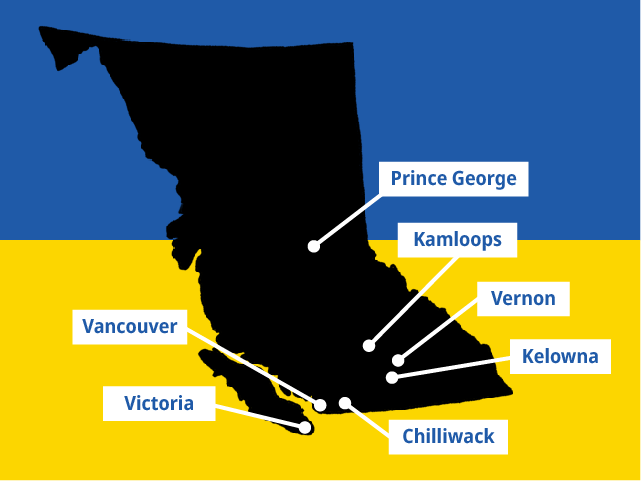Welcoming Ukraine
B.C. is welcoming people from Ukraine to communities across the province.
English | Українська | Русский
On this page
- What to do when you first arrive
- Health care
- Employment, housing and cost of living
- Financial assistance
- Children and education
- I need help
What to do when you first arrive
Scammers are active on social media. Be careful when connecting with people online about travel and housing. Don't send money to strangers.
Immigration is the responsibility of the federal government of Canada. The special measures for the CUAET program have now ended. Those who arrive on or after April 1, 2024, will need to meet the general requirements to enter Canada and won’t be eligible to receive supports offered under the CUAET measures.
Get your immigration medical exam
You must have a medical exam within 90 days of arriving in Canada. If you are enrolled in MSP, you should not be billed for this medical exam or diagnostic tests. If you paid for your immigration exam or tests, you can get those expenses reimbursed.
Learn about British Columbia
Welcome to British Columbia, Canada. Our province has 5.2 million people, including 232,000 Indigenous people from First Nations, Métis and Inuit communities. Canada's official languages are English and French, but most people in B.C. speak English. B.C. is also home to more than 200,000 Ukrainian-Canadians.
Ukrainian communities can be found in cities across the province:
- Metro Vancouver is B.C.'s largest urban area
- Kelowna in the Interior's Okanagan Valley
- Vernon in the North Okanagan
- Victoria is the capital of B.C., located on Vancouver Island
- Kamloops in Thompson Country in the Interior
- Chilliwack in the Fraser Valley, east of Vancouver
- Prince George is the urban centre of Northern B.C.
Getting settled in B.C.
- Review WelcomeBC's guide for your first few days in B.C. and the newcomer's guide to resources and services
- Free settlement services can help you find services and resources like housing or jobs
- Find mental health supports and trauma counselling services
- If you have a driver's licence, you should switch it to a B.C. licence
- You can apply for a Social Insurance Number (SIN) from Service Canada. Getting a SIN is free. If someone asks you to pay, it's a scam

Health care
B.C. offers free health care coverage to all residents. To access health care services, you need to enrol in the B.C. Medical Services Plan. Anyone can access emergency health care in B.C. Find clinics, hospitals and pharmacies near you.
Apply for health insurance
The B.C. Medical Services Plan (MSP) pays for required medical services. You must apply.
You can apply for MSP if:
- You have a valid work permit
- You have permanent resident status
- You arrived in Canada through CUEAT
If there is a gap between when you arrived in B.C. and when you applied for MSP, you are eligible for coverage based on the date you arrived.
Get prescription drug coverage
If you arrived through CUAET and are enrolled in MSP, you are automatically covered under BC PharmaCare.
You will get one year of coverage under PharmaCare Plan C. To ensure you keep your coverage after your first year, you should also register for Fair PharmaCare.
PharmaCare can help pay for:
- Prescription drugs
- Medical supplies
- Pharmacy services
Before you're enrolled in MSP, emergency coverage is available for medications you need urgently. Your doctor or nurse can complete a form (PDF, 1MB) that you take to the pharmacy.
Protect yourself against COVID-19
Vaccination against COVID-19 is free for everyone 6 months and older in B.C. Getting vaccinated is easy and safe.
You can get free COVID-19 test kits from a local pharmacy.
Employment, housing and cost of living
Employment in B.C.
To work in B.C., you need a work permit.
- Learn about working in B.C.
- Visit a WorkBC Centre to get help finding work or training
- Canadian businesses want to hire you. Apply through the federal Job Bank
Housing and cost of living
- Know your rights when renting a home or apartment
- Learn about how much it costs to live in B.C. using WorkBC's Cost of Living Calculator
Financial assistance
Parents or caregivers are typically responsible for supporting youth under the age of 19, B.C.’s age of majority. Youth between the ages of 17 and 19 who do not have parents or caregivers to support them can apply for Ministry assistance. Youth under the age of 17 are referred to the Ministry of Children and Family Development.
Monthly payments from the B.C. government
You can apply for income assistance. Payments are based on need and family size. Review eligibility requirements and learn how to apply.
Children and education
Children under 18
If you have children aged 5 to 18, register them in a local school. Schools in B.C. offer English language learning support for all students who need it.
- Find a school district in your area
- Learn about B.C.'s kindergarten to grade 12 curriculum
- Learn about education in B.C.
Learn how the expect respect and a safe education (erase) plan helps B.C. create safe and caring school communities.
Child care
If you have children under 5, learn how to access child care in B.C.
Your local Child Care Resource and Referral Centre can help you find child care in your area.
I need help
When you phone, translators are available in Ukrainian, Russian and 220 other languages.
Talk to a Service BC agent about government information and services like health care and education.
Dial: 1-800-663-7867. Available 7:30 am to 5 pm Pacific time
